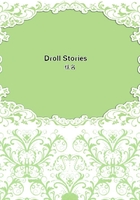
第123章
To have a care to excite no envy, nor strike any onesoever in any manner, because it is needful to be as strong as an oak, which kills the plants at its feet, to crush envious heads, and even then would one succumb, since human oaks are especially rare and that no Tournebouche should flatter himself that he is one, granting that he be a Tournebouche. Thirdly, never to spend more than one quarter of one's income, conceal one's wealth, hide one's goods and chattels, to undertake no office, to go to church like other people, and always keep one's thoughts to oneself, seeing that they belong to you and not to others, who twist them about, turn them after their own fashion, and make calumnies therefrom. Fourthly, always to remain in the condition of the Tournebouches, who are now and forever drapers. To marry your daughters to good drapers, send your sons to be drapers in other towns of France furnished with these wise precepts, and to bring them up to the honour of drapery, and without leaving any dream of ambition in their minds. A draper like a Tournebouche should be their glory, their arms, their name, their motto, their life. Thus by being always drapers, they will be always Tournebouches, and rub on like the good little insects, who, once lodged in the beam, made their dens, and go on with security to the end of their ball of thread. Fifthly never to speak any other language than that of drapery, and never to dispute concerning religion or government. And even though the government of the state, the province, religion, and God turn about, or have a fancy to go to the right or to the left, always in your quality of Tournebouche, stick to your cloth. Thus unnoticed by the others of the town, the Tournebouches will live in peace with their little Tournebouches--paying the tithes and taxes, and all that they are required by force to give, be it to God, or to the king, to the town of to the parish, with all of whom it is unwise to struggle. Also it is necessary to keep the patrimonial treasure, to have peace and to buy peace, never to owe anything, to have corn in the house, and enjoy yourselves with the doors and windows shut.
"By this means none will take from the Tournebouches, neither the state, nor the Church, nor the Lords, to whom should the case be that force is employed, you will lend a few crowns without cherishing the idea of ever seeing him again--I mean the crowns.
"Thus, in all seasons people will love the Tournebouches, will mock the Tournebouches as poor people--as the slow Tournebouches, as Tournebouches of no understanding. Let the know-nothings say on. The Tournebouches will neither be burned nor hanged, to the advantage of King or Church, or other people; and the wise Tournebouches will have secretly money in their pockets, and joy in their houses, hidden from all.
"Now, my dear son, follow this the counsel of a modest and middle-class life. Maintain this in thy family as a county charter; and when you die, let your successor maintain it as the sacred gospel of the Tournebouches, until God wills it that there be no longer Tournebouches in this world."
This letter has been found at the time of the inventory made in the house of Francois Tournebouche, lord of Veretz, chancellor to Monseigneur the Dauphin, and condemned at the time of the rebellion of the said lord against the King to lose his head, and have all his goods confiscated by order of the Parliament of Paris. The said letter has been handed to the Governor of Touraine as an historical curiosity, and joined to the pieces of the process in the archbishopric of Tours, by me, Pierre Gaultier, Sheriff, President of the Trades Council.
The author having finished the transcription and deciphering of these parchments, translating them from their strange language into French, the donor of them declared that the Rue Chaude at Tours was so called, according to certain people, because the sun remained there longer than in all other parts. But in spite of this version, people of lofty understanding will find, in the warm way of the said Succubus, the real origin of the said name. In which acquiesces the author. This teaches us not to abuse our body, but use it wisely in view of our salvation.